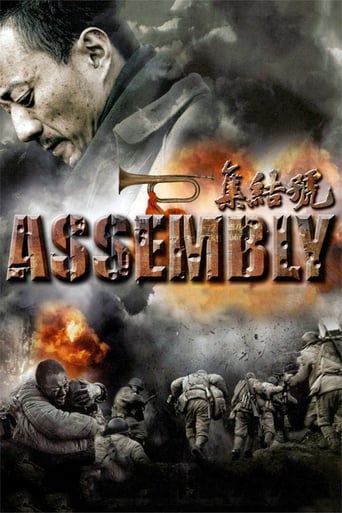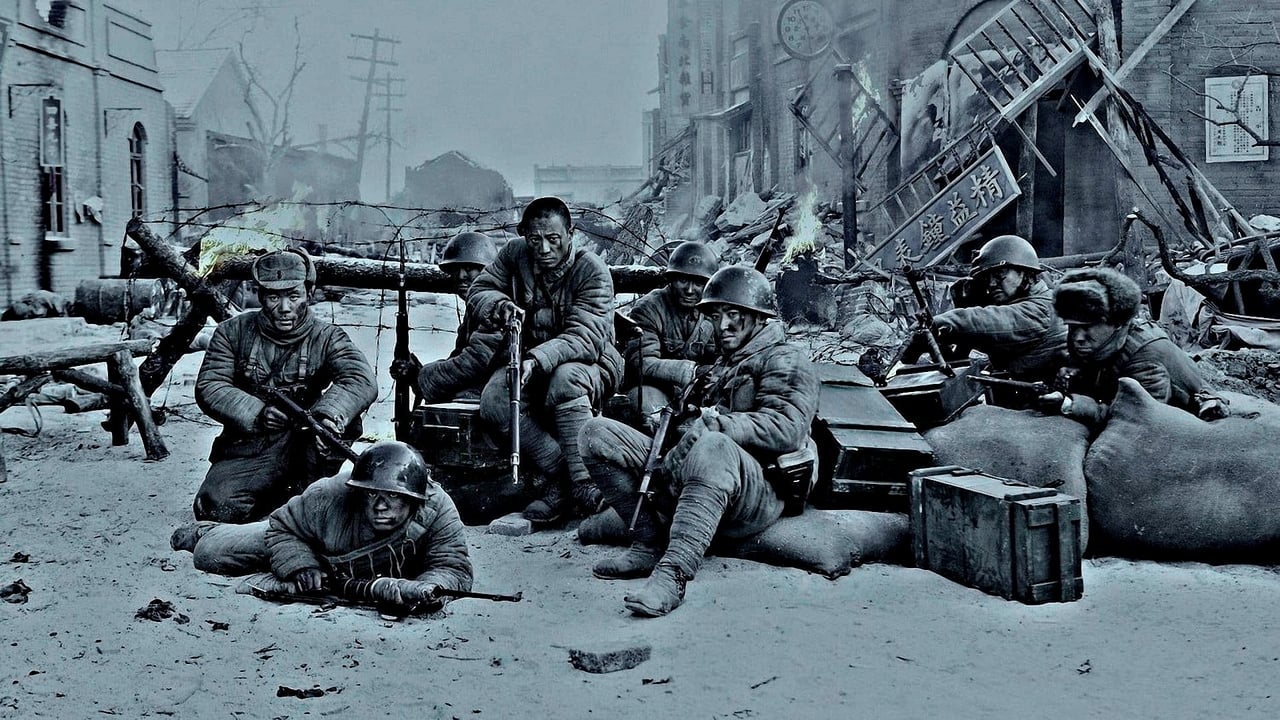gvis
This movie was on my bucket list for a long time, and now I finally watched it.The movie starts off with a battle scene during the Chinese civil war.Gu Zidi is a young officer in (I guess) the Communist army. During the battle he witnessed his superior shot to pieces by artillery. He is transferred to defend a coal mine. The battle goes disastrous. At the same time, the soldiers await for a sign to retreat (the "assembly" tune played on a trumpet, hence the title). This sign never comes, and almost the entire group is whiped out.Gu Zidi survives, only to hear that his men went 'missing', even though he knows they died and their families should be appropriately compensated. Then his quest for justice and truth starts.The movie can be divided in two: one half of war footage. The battles have no shortage of pretty brutal scenes (like Saving Private Ryan) and moments of self sacrifice. Very moving indeed.The second half is his search for truth and justice for his fallen comrades. You see him trying to pick his life up while constanly battling his inner demons. The amazing soundtrack does the rest.This movie is actually a Chinese answer to Saving Private Ryan. If you like war movies, this is a must see.
freemantle_uk
Internationally there are many excellent war that have been made in recent years, such as Russia's The 9th Company, Israel's Lebanon and France's Days of Glory. The producers of the really brilliant Korean film Brotherhood have returned now with a powerful Chinese war film.In the middle of the Chinese Civil War Captain Gu Zidi (Hany Zhang) is a skilled officer in the Communist army but when he disgraces himself he is given a suicide mission to hold an old mine at the South Bank of the Wen River with only 47 men. After his men fight with incredible bravery Gu is only survivor: but the picture is complicated because when he recovers his regiment is chopped and changed and the bodies are hidden in a mine. With no one believing him Gu returns to the army whilst proving his claims his men died as heroes.Saving Private Ryan has been a major influence on war films ever since and it is clear that the filmmakers of Assembly were trying to make a Chinese version of that film. The battle scenes were very similar, using hand-held camera which runs after and follows the troops and , giving the audience an intense feeling about the brutality of battle. There is realistic violence with blood flying all over the place and soldiers being blown to pieces. The action was handled tremendously with some of the best war scenes put to scene in recent years. There are some references to Saving Private Ryan, with the cinematography Yue Lu using a similar colour pallet, the beginning battle scene in an urban setting like the final battle in Saving Private Ryan and the use of an improvised drum artillery was like the sticky bomb in Spielberg's film. There are also clear influences from Brotherhood and Joint Security Area when a soldiers on a landmine. Even though Assembly is influenced by other films Assembly can easily stand on it's own two feet, with a strong story about a soldier suffering from guilt because of his scene of honour and duty prove that his men be classified as heroes like they deserve. Assembly is a film about the brutality of war, the guilt someone can feel, personal and collective redemption and someone trying to do the right and honourable thing.Xiaogang Feng directs a powerful film about how Gu Zidi fights against the odds in more ways then one. As well as the incredible action scenes, Feng is able to handle with skill the emotional drama, showing how Gu suffers and does everything he can to give his men respect after death. Lu's cinematography adds to this showing the beauty but harshness of the Chinese countryside, particularly in the winter to the dark environment of the coal mine. The warfare, costumes and buildings were similar to what it was like in the late 40s and early 50s and film does try to be balance, not making out the Nationalist or Communist to be good or evil. The editing and pacing is just about right, with a fitting running time. The film goes through event quickly and has a good running time of two hours: these films are often more like two and half to three hours, so it is nice to see a film that does not overstay its welcome. But Feng does skip over a few things that we should have seen, like the final battle and how Gu got off a mine.Zhang gives an incredible performance throughout Assembly, showing a wide range, making Gu into a likable character. He was able to show emotion both his voice and his facial and physical expressions. Zhang was also ably supported by the rest of the cast, making Assembly a worthy war drama.Highly recommended.
honorhorror
Besides all the positive reviews about its realistic visual style, the shaky camera and all the "Private Ryan" stuff, it really deserved compliments from Chinese people, while we can see the true differences between Chinese people and Western people in a cultural perspective.I've read some reviews criticizing the Assembly for it being too "western", and has significantly less character development in the entire movie, but to state in short Assembly is a movie purely shot from the angle of Captain Gu, who is the main man in the movie. It is very unusual to portray any war from an individual perspective for Chinese, even not in recent years. However, once someone wants to try it, it will come out with some side effects bound with Chinese culture. 1, Captain Gu's character is very "north-Chinese", which means he takes everything personally and with high dedication. Usually, he takes his men more than brothers. When brothers die, he cares about their bodies and believes they will be reincarnated. This is very typical Chinese man-man relationship in a near-modern china. Plus, the supporting characters are not memorable enough due to the magnitude of this Chinese civil war. China has the largest population in the world, which means one or two lives are not significant. And even the director strives to focus on individuals, such reality still rule the whole story.2, Captain Gu's has a significant pursuit over the comrades' honor they deserved. However if you were Chinese, you would feel the motivations behind this action are strongly related to Chinese beliefs. Gu has strong emotions on his men, but he never accepted the truth that they are all gone. He'd believe they wouldn't rest in peace because the earthly honor unattained. Besides, director Feng Xiaogang apparently deviated from the typical Chinese war movies' atheism tune and communism campaign injected by political needs. This is to note the fact that very few man purely completely accepted atheism, even in a Communism China.Well done. This is a Chinese war movie about the wide gray scale in the war and in China. 2, Captain Gu's
Master_of_My_Domain
"Saving Private Ryan" it is NOT, but certainly it is as equally worth viewing for any fans of military/warfare film. And for any "westerners" unaccustomed with China's history, it may give some insight to tiny part of her modern part some 50+ years ago events that led to fall of Chang Kai Shek and rise of communism under Mao Zhe Dong's.The story line is compelling, similarly to "SPR" we have some well drawn all-human characters and their war story laced with brutal, bloody and yet so mesmerizing scenes, an insight to mankind at its worst.The acting is excellent, even the supporting actors and extras performed all great or at least sufficiently enough to make us believe the scenes we are watching could have happened exactly as they are portrayed on the screen.Why then I gave it 9 instead of 10? Well. Firstly. The film, although officially not the production of "1st of August Film Studio" (official Chinese communist party's propaganda flicks maker), it still suffers a bit from their propagandist influence. The red comrades are nicer than their nationalist foes and - according to this film's tones and "between the lines" messages - they fought for their country (implying that the Chang Kai Shek's nationalists were traitors). Like the hundreds of millions Chinese murdered later by the China's Communist Party during the years that followed have never happened, hmm. But, of course, for the characters shown in the film, it is their future. They don't know it yet - OK, I can believe that. But why PLA's foes (the Nationalists) are basically the shadows in this film? For a "humane warfare film" (as this film is pretending to be about) it is very unhuman depiction of 'the other side' - and I didn't hear anything about Mr. Xiaogang Feng plans to make a sequel about them... (like Clint Eastwood did with "Flags of Our Fathers" and "Letters from Iwo Jima") Second. While the fighting scenes and visual FX are great, the sets weren't prepared as equally. And I really mean it. The hand-held camera actions, the gory, the over-all realism of the brutal warfare scenes are almost as great as the ones in "SPR". But unfortunately the set decorators more often than not were skimping on the realism of the set. So-obvious spray-painting black patches on the walls (to masquerade them as burnt-out or post-explosion marks) is so evident failure of completing the film's realism to me (and I'm not even mentioning those PLA soldiers wearing US helmets - after all it *may* have happened somehow). Yes, I understand that most of the film-viewers wouldn't even notice it, but since so much energy, so much attention to other details was paid during the production of this film, why oh why they couldn't close it complete in every detail?


 AD
AD





